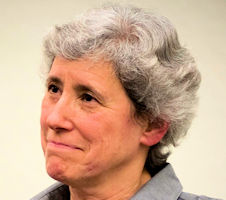

 |
Professor Lucy SuchmanLancaster UniversityWonderful news! I’m truly honoured. |
My relationship with Computer Science is a rather atypical one, as I’ve become an honorary member of the field despite having done all of my postgraduate work in anthropology. I was a PhD student in anthropology at the University of California, Berkeley when I arrived at Xerox’s Palo Alto Research Center (PARC) in 1979, first as a Research Assistant, then a Research Intern, and eventually a member of the research staff and Principal Scientist. What drew me to Computer Science was a critical – but also it turned out very generative – engagement with understandings of the human and of interaction that informed the fields of artificial intelligence and HCI beginning in the 1980s. My PhD dissertation was the basis for my first book Plans and Situated Actions: the problem of human-machine communication (CUP 1987); I returned to that book and expanded its argument twenty years later in Human-Machine Reconfigurations (2007).
At PARC I was also the co-founder and Manager of the Work Practice and Technology area, an interdisciplinary research group established in 1989. I served as Program Chair for the Second Conference on Computer-Supported Cooperative Work in 1988, and for the first Conference on Participatory Design of Computer Systems in 1990; I was also a founding member of Computer Professionals for Social Responsibility, and served on its Board of Directors from 1982-1990.
Following my twenty years at Xerox PARC I made a very welcome move to the Department of Sociology at Lancaster University in the UK, to take a Chair in the Anthropology of Science and Technology. In 2002 I received the Benjamin Franklin Medal in Computer and Cognitive Sciences, in 2010 the ACM SIGCHI Lifetime Research Award, and in 2014 the Society for Social Studies of Science Bernal Prize for Contributions to the Field. I am deeply grateful for these honours, and for the many other women I’ve met working to take the field of Computer Science in new directions, with careful attention to the social and political implications of the systems that we design and build.
